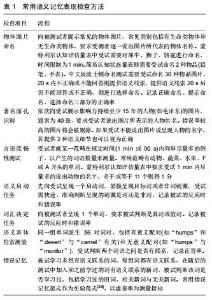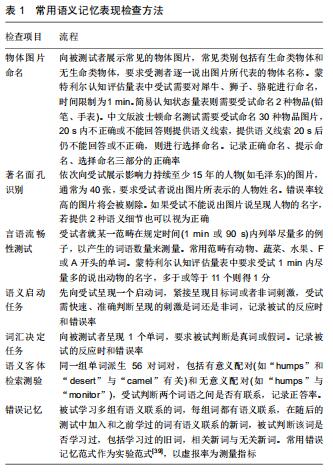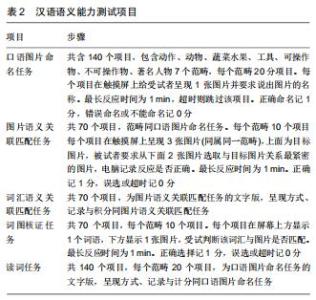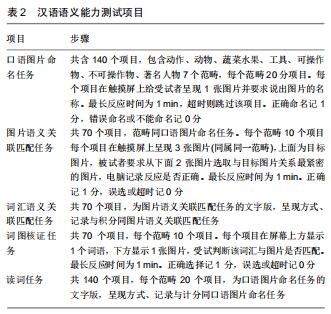Chinese Journal of Tissue Engineering Research ›› 2020, Vol. 24 ›› Issue (32): 5236-5242.doi: 10.3969/j.issn.2095-4344.2789
Previous Articles Next Articles
Semantic memory impairment and neuroregulation in patients with mild cognitive impairment
Li Ying1, Guan Hantian2, Zhou Yu1
1Department of Rehabilitation Medicine, the Second Affiliated Hospital of Guangzhou Medical University, Guangzhou 510260, Guangdong Province, China; 2Department of Clinical Medicine, Guangzhou Medical University, Guangzhou 511436, Guangdong Province, China
-
Received:2019-12-28Revised:2020-01-04Accepted:2020-02-19Online:2020-11-18Published:2020-09-26 -
Contact:Guan Hantian, Department of Clinical Medicine, Guangzhou Medical University, Guangzhou 511436, Guangdong Province, China -
About author:Li Ying, Technician in charge, Department of Rehabilitation Medicine, the Second Affiliated Hospital of Guangzhou Medical University, Guangzhou 510260, Guangdong Province, China -
Supported by:Guangdong University Student Innovation and Entrepreneurship Training Program Project, No. S201910570004
CLC Number:
Cite this article
Li Ying, Guan Hantian, Zhou Yu. Semantic memory impairment and neuroregulation in patients with mild cognitive impairment[J]. Chinese Journal of Tissue Engineering Research, 2020, 24(32): 5236-5242.
share this article
|
[1] 于华林,詹向红.轻度认知障碍研究进展[J].山东中医杂志, 2013,32(6): 69-71.
[2] PETERSEN RC, DOODY R, KURZ A, et al. Current concepts in mild cognitive impairment. Arch Neurol. 2001;58(12):1985-1992.
[3] CHANG HT, CHIU MJ, CHEN TF, et al. Distinct Patterns and Clinical Implications of Semantic Memory Deterioration Among Patients With MCI. Alzheimer Dis Assoc Disord. 2015;29(2):124-134.
[4] RICH JB. Semantic Memory. In: Kreutzer J, DeLuca J, Caplan B, eds. Encyclopedia of Clinical Neuropsychology. Cham: Springer. 2017.
[5] BALTHAZAR ML, CENDES F, DAMASCENO BP. Semantic error patterns on the Boston Naming Test in normal aging, amnestic mild cognitive impairment, and mild Alzheimer's disease: is there semantic disruption?. Neuropsychology. 2008;22(6):703-709.
[6] 刘红艳.认知障碍患者语言认知障碍及言语语言治疗研究[J].教育理论与实践,2014,34(21):41-43.
[7] 闫超群,张帅,周平,等.阿尔茨海默病相关概念研究进展[J].中华老年多器官疾病杂志,2018,17(4):305-308.
[8] GARDINI S, CUETOS F, FASANO F, et al. Brain structural substrates of semantic memory decline in mild cognitive impairment. Curr Alzheimer Res. 2013;10(4):373-389.
[9] JOUBERT S, FELICIAN O, BARBEAU EJ, et al. Patterns of semantic memory impairment in Mild Cognitive Impairment. Behav Neurol. 2008; 19(1-2):35-40.
[10] 张雪晴.社区老年轻度认知功能障碍患者的认知损害特点[J].中国老年学杂志,2013,33(10):2331-2334.
[11] 于红梅,王鹏,何次,等.图片命名任务在额颞叶激活区的fMRI研究[J].实用放射学杂志,2016,32(11):1651-1654.
[12] 张磊,金真,李科,等.动词联想及图片命名任务激活大脑语言功能区的fMRI研究[J].放射学实践,2013,28(3):251-255.
[13] BALTHAZAR ML, YASUDA CL, PEREIRA FR, et al. Coordinated and circumlocutory semantic naming errors are related to anterolateral temporal lobes in mild AD, amnestic mild cognitive impairment, and normal aging. J Int Neuropsychol Soc. 2010;16(6):1099-1107.
[14] DUDAS RB, CLAGUE F, THOMPSON SA, et al. Episodic and semantic memory in mild cognitive impairment. Neuropsychologia. 2005;43(9):1266-1276.
[15] BORG C, THOMAS-ANTÉRION C, BOGEY S, et al. Visual imagery processing and knowledge of famous names in Alzheimer's disease and MCI. Neuropsychol Dev Cogn B Aging Neuropsychol Cogn. 2010; 17(5):603-614.
[16] AHMED S, ARNOLD R, THOMPSON SA, et al. Naming of objects, faces and buildings in mild cognitive impairment. Cortex. 2008;44(6): 746-752.
[17] ESTÉVEZ-GONZÁLEZ A, GARCÍA-SÁNCHEZ C, BOLTES A, et al. Semantic knowledge of famous people in mild cognitive impairment and progression to Alzheimer's disease. Dement Geriatr Cogn Disord. 2004;17(3):188-195.
[18] JOUBERT S, BRAMBATI SM, ANSADO J, et al. The cognitive and neural expression of semantic memory impairment in mild cognitive impairment and early Alzheimer's disease. Neuropsychologia. 2010; 48(4):978-988.
[19] 王延平,李海员,杨少青,等.轻度认知功能障碍患者的神经心理学研究[J].中华神经医学杂志,2010,9(4):412-415.
[20] 张积家,陆爱桃.言语流畅的测量及其神经生理基础[J].中国组织工程研究与临床康复,2007,11(17):3407-3410.
[21] CLARK DG, WADLEY VG, KAPUR P, et al. Lexical factors and cerebral regions influencing verbal fluency performance in MCI. Neuropsychologia. 2014;54:98-111.
[22] 肖世富,姚培芬,薛海波,等.老年轻度认知功能损害的认知缺损特点研究[J].中国临床心理学杂志,2002,10(3):161-164.
[23] 李盼盼.动物词语流畅性测验的图形分析在不同认知障碍患者的差异性研究[D].济南:山东大学,2016.
[24] SAXTON J, LOPEZ OL, RATCLIFF G, et al. Preclinical Alzheimer disease: neuropsychological test performance 1.5 to 8 years prior to onset. Neurology. 2004;63(12):2341-2347.
[25] VAUGHAN RM, COEN RF, KENNY R, et al. Semantic and Phonemic Verbal Fluency Discrepancy in Mild Cognitive Impairment: Potential Predictor of Progression to Alzheimer's Disease. J Am Geriatr Soc. 2018;66(4):755-759.
[26] KIM SR, KIM S, BAEK MJ, et al. Abstract Word Definition in Patients with Amnestic Mild Cognitive Impairment. Behav Neurol. 2015;2015: 580246.
[27] GARDINI S, VENNERI A, SAMBATARO F, et al. Increased functional connectivity in the default mode network in mild cognitive impairment: a maladaptive compensatory mechanism associated with poor semantic memory performance. J Alzheimers Dis. 2015;45(2):457-470.
[28] 伍姗姗,谭金凤,王丽君,等.阈下语义启动效应影响因素述评[J].心理科学进展,2013,21(4):626-636.
[29] DUONG A, WHITEHEAD V, HANRATTY K, et al. The nature of lexico-semantic processing deficits in mild cognitive impairment. Neuropsychologia. 2006;44(10):1928-1935.
[30] 张钦.词汇决定任务评析[J].心理学动态,1998(4):16-20.
[31] MANOUILIDOU C, DOLENC B, MARVIN T, et al. Processing complex pseudo-words in mild cognitive impairment: The interaction of preserved morphological rule knowledge with compromised cognitive ability. Clin Linguist Phon. 2016;30(1):49-67.
[32] BUSH AL, ALLEN PA, KAUT KP, et al. Influence of mild cognitive impairment on visual word recognition. Neuropsychol Dev Cogn B Aging Neuropsychol Cogn. 2007;14(4):329-352.
[33] GOLD BT, JIANG Y, JICHA GA, et al. Functional response in ventral temporal cortex differentiates mild cognitive impairment from normal aging. Hum Brain Mapp. 2010;31(8):1249-1259.
[34] KRAUT MA, CHERRY B, PITCOCK JA, et al. The Semantic Object Retrieval Test (SORT) in amnestic mild cognitive impairment. Cogn Behav Neurol. 2007;20(1):62-67.
[35] LI J, KRUAT M, PITCOCK, JA, et al. Changes of low frequency cortical rhythms during semantic memory recall in mild cognitive impairment. J Cogn Neurosci. 2006,13:s225
[36] 肖红蕊,龚先旻,王大华,等.老年人错误记忆的情绪效价和时间效应[J].心理学报,2014,46(7):922-930.
[37] BELLEVILLE S, SYLVAIN-ROY S, DE BOYSSON C, et al. Characterizing the memory changes in persons with mild cognitive impairment. Prog Brain Res. 2008;169:365-375.
[38] DANNHAUSER TM, SHERGILL SS, STEVENS T, et al. An fMRI study of verbal episodic memory encoding in amnestic mild cognitive impairment. Cortex. 2008;44(7):869-880.
[39] 黄一帆,王大华,肖红蕊,等.DRM范式中错误记忆的年龄差异及其机制[J].心理发展与教育,2014,30(1):26-32.
[40] 冯晖艳,宋鲁平,韩在柱,等.汉语语义能力测验的编制及临床价值[J].中国康复理论与实践,2014,20(3):255-258.
[41] 沈银,骆雄,唐牟尼等.简明精神状态检查和蒙特利尔认知评估量表筛查社区老年人中轻度认知功能障碍及痴呆的应用分析[J].中华精神科杂志, 2014,47(5):293-297.
[42] 李阳,李小凤.4种神经心理学量表在阿尔茨海默病早期诊断中的应用比较研究[J].重庆医科大学学报,2014,38(4):488-492.
[43] 贾建平,王荫华,张振馨,等.中国痴呆与认知障碍诊治指南(三):神经心理评估的量表选择[J].中华医学杂志,2011,91(11):735-741.
[44] 孔伶俐,孙忠国,周田田,等.蒙特利尔认知评估量表在轻度认知功能障碍诊断中的应用[J].中国健康心理学杂志, 2015,23(8):1212-1215.
[45] 周钰,陈卓铭,黎莹,等.轻度认知障碍的神经心理测量[J].华西医学,2019, 34(5):93-98.
[46] 李沁洁,苗雅,钟远.华山版听觉词语学习测验在遗忘型轻度认知障碍诊断中的应用[J].老年医学与保健,2016,22(5):282-285.
[47] 杨玉萍.听觉词语学习测验华山版对aMCI的早期诊断优于MMSE和MoCA[D].苏州:苏州大学,2017
[48] MARTIN A, CHAO LL. Semantic memory and the brain: structure and processes. Curr Opin Neurobiol. 2001;11(2):194-201.
[49] ZHANG L, SUN WH, XING M, et al. Medial Temporal Lobe Atrophy is Related to Learning Strategy Changes in Amnestic Mild Cognitive Impairment. J Int Neuropsychol Soc. 2019;25(7):706-717.
[50] KOURTZI Z, KANWISHER N. Activation in human MT/MST by static images with implied motion. J Cogn Neurosci. 2000;12(1):48-55.
[51] SENIOR C, BARNES J, GIAMPIETRO V, et al. The functional neuroanatomy of implicit-motion perception or representational momentum. Curr Biol. 2000;10(1):16-22.
[52] HART J JR, MAGUIRE MJ, MOTES M, et al. Semantic memory retrieval circuit: role of pre-SMA, caudate, and thalamus. Brain Lang. 2013;126(1):89-98.
[53] BINDER JR, DESAI RH. The neurobiology of semantic memory. Trends Cogn Sci. 2011;15(11):527-536.
[54] 隆世宇,王晓明.遗忘型轻度认知功能障碍的研究进展[J].癫痫与神经电生理学杂志,2015,24(2):123-128.
[55] 高寒,韩立新,白红民,等.针对汉语母语者对3种语言任务BOLD-fMRI 语言区定位的研究[J].中华神经医学杂志, 2015,14(6):627-631.
[56] HANTKE N, NIELSON KA, WOODARD JL, et al. Comparison of semantic and episodic memory BOLD fMRI activation in predicting cognitive decline in older adults. J Int Neuropsychol Soc. 2013;19(1): 11-21.
[57] 郑金龙,舒斯云,刘颂豪,等.语义记忆脑功能区偏侧化的功能磁共振成像研究[J].中国神经精神疾病杂志,2009,35(10):605-608.
[58] BARBEAU EJ, DIDIC M, JOUBERT S, et al. Extent and neural basis of semantic memory impairment in mild cognitive impairment. J Alzheimers Dis. 2012;28(4):823-837.
[59] VISSER M, EMBLETON KV, JEFFERIES E, et al. The inferior, anterior temporal lobes and semantic memory clarified: novel evidence from distortion-corrected fMRI. Neuropsychologia. 2010;48(6):1689-1696.
[60] VAN DER MEULEN M, LEDERREY C, RIEGER SW, et al. Associative and semantic memory deficits in amnestic mild cognitive impairment as revealed by functional magnetic resonance imaging. Cogn Behav Neurol. 2012;25(4):195-215.
[61] ABÁSOLO D, HORNERO R, GÓMEZ C, et al. Analysis of EEG background activity in Alzheimer's disease patients with Lempel-Ziv complexity and central tendency measure. Med Eng Phys. 2006;28(4): 315-322.
[62] 祝本菊,陈旭.轻度认知功能障碍患者的脑电复杂度分析[J].中华老年心脑血管病杂志,2017,19(11):1129-1132.
[63] 纪道文,随瑞斌,盛倩倩,等.轻度认知功能障碍脑电Lemple-Ziv复杂度变化随访研究[J].中华老年心脑血管病杂志, 2016,18(7):730-733.
[64] LEVADA OA, TRAILIN AV, KVITKA AL, et al. P300 Potential Parameters at the Stages of Formation of the Subcortical Vascular Dementia in Elderly. Lik Sprava. 2014;(1-2):60-66.
[65] 刘美英,黄苗苗,房哲,等.P200复合波在记忆障碍患者中的诊断价值[J].中华老年心脑血管病杂志,2017,19(1):70-73.
[66] 粟华利.汉字语音语义激活时间进程的ERP研究[D].长沙:湖南师范大学, 2011.
[67] SIMON SS, HAMPSTEAD BM, NUCCI MP, et al. Cognitive and Brain Activity Changes After Mnemonic Strategy Training in Amnestic Mild Cognitive Impairment: Evidence From a Randomized Controlled Trial. Front Aging Neurosci. 2018;10:342.
[68] CALLAHAN BL, ANDERSON ND. Effect of conceptual and lexical errorless versus trial-and-error learning in amnestic mild cognitive impairment. Neuropsychol Rehabil. 2019;29(6):969-982.
[69] DÍEZ E, GÓMEZ-ARIZA CJ, DÍEZ-ÁLAMO AM, et al. The processing of semantic relatedness in the brain: Evidence from associative and categorical false recognition effects following transcranial direct current stimulation of the left anterior temporal lobe. Cortex. 2017;93: 133-145.
[70] GOMES MA, AKIBA HT, GOMES JS, et al. Transcranial direct current stimulation (tDCS) in elderly with mild cognitive impairment: A pilot study. Dement Neuropsychol. 2019;13(2):187-195.
[71] SMITH JC, NIELSON KA, ANTUONO P, et al. Semantic memory functional MRI and cognitive function after exercise intervention in mild cognitive impairment. J Alzheimers Dis. 2013;37(1):197-215.
[72] SMITH JC, NIELSON KA, WOODARD JL, et al. Does physical activity influence semantic memory activation in amnestic mild cognitive impairment?. Psychiatry Res. 2011;193(1):60-62.
[73] 阎澍妤,宋为群.经颅磁刺激在阿尔茨海默病和轻度认知障碍中的临床研究和应用进展[J].中国康复医学杂志, 2015,30(1):69-72.
[74] 隆世宇,王晓明,罗成,等.重复经颅磁刺激对遗忘性轻度认知功能障碍患者认知功能及长程功能性连接的影响[J].中国老年学杂志,2018,38(4): 785-788.
[75] 温秀云,曹雪丽,邱国荣,等.重复经颅磁刺激对遗忘型轻度认知障碍的影响[J].中国老年学杂志,2018,38(7):1662-1663.
[76] 章礼勇,袁良津,王玉.重复经颅磁刺激对轻度认知功能障碍患者认知功能的影响[J].临床神经病学杂志,2014,27(3):203-206.
[77] 赵景茹,吕佩源.2017年AAN轻度认知功能障碍实践指南解读[J].中国全科医学,2018,21(12):1387-1391.
[78] ADLAM AL, BOZEAT S, ARNOLD R, et al. Semantic knowledge in mild cognitive impairment and mild Alzheimer's disease. Cortex. 2006;42(5): 675-684. |
| [1] | Song Yancheng, Kang Liqing, Shen Canghai, Liu Fenghai, Feng Yongjian. Application of task-state fMRI in evaluating disease severity and prognosis of cervical spondylotic myelopathy [J]. Chinese Journal of Tissue Engineering Research, 2020, 24(21): 3341-3346. |
| [2] | Song Xiaoneng, Hu Linghui, Huang Desheng, Zhou Xuchang, Wu Wei. Exercise in the prevention and treatment of knee osteoarthritis: key factors and cautions [J]. Chinese Journal of Tissue Engineering Research, 2020, 24(2): 289-295. |
| [3] | Liu Hui, Liu Bo, Zhang Xin, Zhao Weixia, Yan Pan, Jing Zhuzi, Liang Junhao, Shen Hai. Open and closed kinetic chain exercises for meniscus lesions [J]. Chinese Journal of Tissue Engineering Research, 2020, 24(11): 1733-1737. |
| [4] | Liu Dongqi1, Li Rongmei1, Zhang Meiqi1,Chen Yanyan1, Zhang Haiping2 . Meta-analysis of the effect of aerobic exercise on mild cognitive impairment in the elderly [J]. Chinese Journal of Tissue Engineering Research, 2019, 23(35): 5727-5731. |
| [5] | Qin Huasheng1, Pan Weimin2, Li Ran1, Li Xintong1. Sports rehabilitation of chronic ankle instability: research status and characteristics [J]. Chinese Journal of Tissue Engineering Research, 2018, 22(36): 5865-5871. |
| [6] | Fu Tao, Li Yan-hu. Functional rehabilitation training improves adolescent idiopathic scoliosis [J]. Chinese Journal of Tissue Engineering Research, 2017, 21(28): 4462-4468. |
| [7] | Zhang Xin-an. Cortical mechanism underlying aerobic exercise promoting cognitive function of vascular dementia rats: study protocol for a randomized controlled trial [J]. Chinese Journal of Tissue Engineering Research, 2016, 20(46): 6943-6949. |
| [8] | Yang Lu-xin, Guo Jun-hao, Cai Hui. Exercise for primary osteoporosis: effects of different exercise pattern, intensity and frequency on bone mineral density [J]. Chinese Journal of Tissue Engineering Research, 2014, 18(38): 6200-6204. |
| [9] | Shen Mei, Yu Min, Che Shi-qin, Jin Ke-xin, Ma Li, Wang Ping. Effects of exercise training on bradykinin expression in rats with myocardial infarction [J]. Chinese Journal of Tissue Engineering Research, 2014, 18(2): 239-244. |
| [10] | Wang Chun-yan, He Cheng-qi . Exercise in the treatment of osteoporosis [J]. Chinese Journal of Tissue Engineering Research, 2013, 17(37): 6657-6663. |
| Viewed | ||||||
|
Full text |
|
|||||
|
Abstract |
|
|||||



